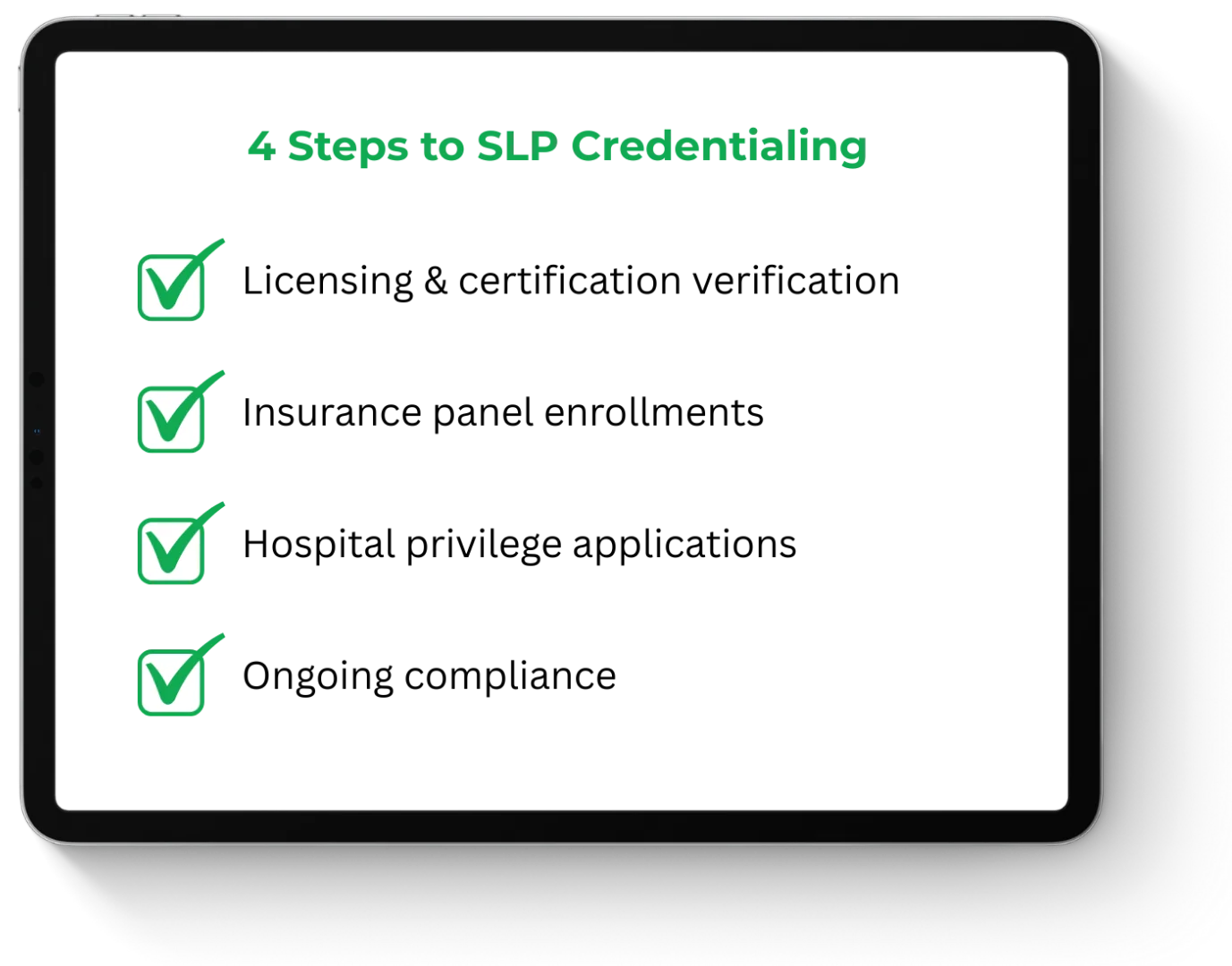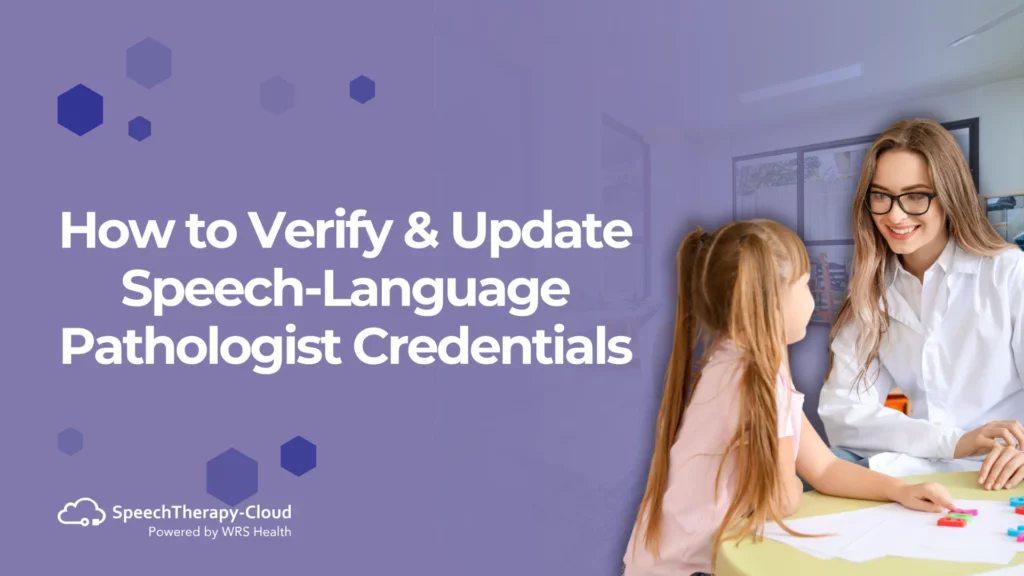Key Takeaways
- Credentialing, different from certification, is essential for compliance and patient safety.
- Errors or lapses in the maintenance process can disrupt patient care and revenue.
- Developing a process, in-house or with a specialty-specific partner, protects your licensure and practice.
- Learn how SpeechTherapy-Cloud supports speech-language pathologists in credentialing management.
Launching a career as a speech-language pathologist (SLP) is a significant milestone—one that promises the opportunity to improve lives through communication and cognitive care. However, building a sustainable and thriving career goes beyond clinical expertise. It means staying up-to-date with stringent standards, such as those required for credentialing.
Maintaining accurate speech-language pathologist credentials is non-negotiable for compliance, on-time reimbursements, and patient trust, especially for therapists running a speech therapy private practice insurance credentialing workflow on their own.
Table of Contents
Understanding Speech Therapist Certification & Credentialing
Speech-language pathologist credentials often overlap and must be maintained over time. While certification (like ASHA’s CCC-SLP) attests to your educational and professional qualifications, credentialing refers to the ongoing process of verification required by employers, insurers, and regulatory agencies.
Key distinctions include:
ASHA Certification (CCC-SLP): Awarded by the American Speech-Language-Hearing Association (ASHA), this demonstrates that you meet national standards in academic and clinical preparation. It’s essential for many employers and insurance panels.
State Licensure: SLPs must be licensed in each state where they practice. Licensure boards typically require proof of ASHA certification and passing the Praxis exam.
Credentialing With Payers and Hospitals: This involves verifying education, licensure, and malpractice history to get listed on insurance panels or be granted privileges at healthcare facilities.
All of these must be actively maintained and periodically renewed to remain in good standing and continue practicing as an SLP.
Challenges in the Credentialing Process
Navigating the credentialing process can be time-consuming and is often frustrating due to complex administrative demands. Many therapists and speech therapy practice managers face common roadblocks like:
- Incomplete Applications: Missing or incorrect documentation can result in rejections or prolonged approval timelines.
- Regulatory Variability: Requirements differ across states and insurers, creating confusion and increasing the risk of non-compliance.
- Frequent Re-verifications: Licenses and certifications often need renewal every 1–2 years, requiring diligent tracking.
- Insurance Panel Waitlists: Getting paneled with insurers can take months, delaying patient care and revenue flow.
Keeping credentials for speech-language pathologist staff current across multiple state boards is a constant administrative hurdle. Even experienced SLPs find themselves managing a patchwork of portals, deadlines, and paperwork, and a professional credentialing service can handle these complexities with accuracy and ease.
How Credentialing Impacts Your Revenue Cycle
Errors or lapses in speech therapy private practice insurance credentialing can directly affect your bottom line. Without the proper verifications, insurance companies may deny claims, and hospitals may refuse to grant privileges, leaving you unable to bill for services rendered. This can put your practice, and your referral network, at risk.
Errors or delays in your credentialing can have immediate financial consequences:
- Denied Insurance Claims: If you’re not properly credentialed, insurers won’t reimburse services.
- Delays in Patient Onboarding: Without active insurance enrollments, you may be unable to start or continue therapy services.
- Interrupted Practice: Some states and facilities suspend your ability to practice if credentials expire.
Proper credentialing means you remain compliant and reimbursable—cornerstones of a healthy private practice.

Credentialing Partner: A Smart Solution for SLPs
Services like SpeechTherapy-Cloud specialize in medical credentialing for SLPs, offering critical support by managing:
- State license renewals
- Certification tracking
- Insurance panel applications
- Documentation and audit preparedness
By outsourcing credentialing, you free up time to focus on clinical care while ensuring that every credential and compliance milestone is met on time. With so many tasks to juggle to properly manage operations and patient care, the right compliance partner can ease your administrative burden.
Simplify Your Credentialing
Credentialing is an essential yet often time-consuming aspect of a speech-language pathologist’s career. A well-managed credentialing process can ease the administrative burden significantly, allowing SLPs to focus more on clinical care and other aspects of practice management.
A specialty-specific partner that understands speech-language pathologist credentials can help providers stay organized and proactive—tracking renewal deadlines, flagging upcoming expirations, centralizing important documents, and ensuring insurance enrollments and privileges remain active. Outsourcing attention to these tasks can protect your ability to provide uninterrupted services but also preserve steady revenue flow and maintain compliance with ever-evolving regulations.
For speech-language pathologists, mastering the required credentialing process is key to long-term professional success.
FAQs:
Q1. How often should I renew my speech-language pathologist credentials?
Speech-language pathologist licenses and certifications usually need to be renewed every 1–2 years, depending on state and organizational requirements. Staying on top of renewals ensures you remain compliant, avoiding interruptions in practice
Q2. What documents do insurers need for speech therapy private practice insurance credentialing?
Insurers generally require proof of education, active state licensure, malpractice insurance, work history, and ASHA certification (CCC-SLP). Having complete and accurate documentation speeds up approval and reduces delays
Q3. Can a credentialing partner save me money on claim denials?
Yes, a credentialing partner helps prevent errors that often lead to insurance claim denials and revenue loss. They make sure your credentials, enrollments, and renewals stay up-to-date with payer requirements.










